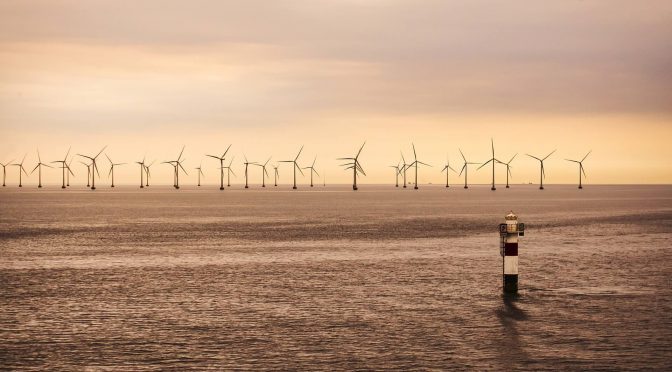Global Wind Energy Council (GWEC), in partnership with the World Bank Group, held the first intergovernmental forum for emerging markets with strong offshore wind potential in London this week. The forum brought together governments, commercial developers, development partners and wind energy experts from developing countries in order to realise the offshore wind potential in emerging markets.
The delegation included representatives from 12 governments, including: Algeria, Argentina, Brazil, Costa Rica, India, Indonesia, Morocco, Poland, Sri Lanka, South Africa, Turkey and Vietnam. These countries already represent nearly a fifth of forecasted onshore installation capacity up to 2023 and the activity in the UK was focused on sharing the commercial, regulatory and planning learnings that will encourage the development of their offshore wind pipelines too.
The arrival of the delegation during Renewable UK’s Global Offshore Wind Summit in London is testament to the success story of offshore wind industry in the UK, whose experience can help other countries with potential to attract investment, create jobs and ensure their communities are benefitting from cost-effective clean energy.

The delegation started off the week with a seminar supported by the Department for Business, Energy and Industrial Strategy in the UK. GWEC brought in experts from both the industry and UK’s government to discuss a wide-range of topics such as regulatory frameworks the UK used to boost their offshore industry, innovative technology developments, case studies of auctions and tenders, as well as how to plan to develop offshore wind farms.
During Day 2 of the tour, the delegation attended RenewableUK’s Global Offshore Wind 2019, one of the largest offshore wind events in Europe. Here, they had the opportunity to put the learnings from the first day in practice with a workshop to better understand the opportunities and challenges for offshore wind in each of these high potential markets. The delegates then had the opportunity to network with leaders in the offshore wind industry during an exclusive networking session at the event.
The last half of the week consisted of a study tour to North East England to experience first-hand the benefits that a thriving offshore wind industry can bring in terms of supply chain investment, jobs and of course, clean energy.
North East England has been at the forefront of the offshore wind industry since its inception and is recognised as a key strategic location to service the European and Global market. In addition to being home to the UK’s first offshore wind farm, off the coast of Blyth, Northumberland, it has developed an extremely innovative and successful integrated supply chain, which is technologically driven and experienced in delivering large scale projects across the sector, supporting several thousand jobs in the region.
During the visit, the delegation visited key locations and companies including the Port of Blyth where they will tour facilities operated by DeepOcean, Global Marine, Royal IHC and Port Training Services.
They also were shown the innovation taking place at the Offshore Renewable Energy (ORE) Catapult, which is located at the port, which is developing next generation technologies for the sector in partnership with supply chain companies.
In the south of the region the delegation visited JDR, Offshore Structures Britain, RelyOnNutec and Van Oord / MPI Offshore as well as attending Hartlepool College where they will hear presentations from PD Ports and the Tees Valley Combined Authority.

This week marked an important step forward in our partnership with the World Bank Group to help support the development of the next-generation of leading countries in offshore wind. Markets like the UK, Europe and China have already made significant strides in building offshore capacity but the real potential for offshore remains untapped. Offshore wind provides scalable, zero-emissions power in relatively short time frames and costs continue to come down, making it a highly attractive source of generation for an increasing amount of countries.”
GWEC’s landmark partnership with the World Bank Group’s Energy Sector Management Assistance Program (ESMAP) and the International Finance Corporation (IFC) on efforts to accelerate the uptake of offshore wind in emerging markets was announced earlier this year. The program is taking place in cooperation with the GWEC and its Global Offshore Wind Task Force, which brings together leading offshore wind developers, equipment manufacturers and service providers to support emerging markets in creating a regulatory and business environment conducive to offshore wind market growth.
The GWEC Global Offshore Wind Task Force was established in September 2018 and is chaired by Alastair Dutton, who previously worked for the UK Crown Estate, BEIS and BP. Its purpose is to advise governments on regulatory frameworks and tendering systems for offshore wind; measure and highlight the economic and social benefits of offshore wind and the deployment of local supply chains; foster technological innovation and the testing of new turbines, installation techniques and operations and maintenance (O&M) strategies, including promoting the benefits of digitalisation; spread best practices and transfer knowledge from Europe and other established markets to new and developing markets; and, create appropriate forums to promote the growth of the global offshore wind industry, from seminars and technical workshops to conferences and exhibitions. Henrik Stiesdal, the former Siemens Windpower CTO and the “father” of the offshore wind energy industry, acts as GWEC Ambassador for the Global Offshore Wind Task Force.


